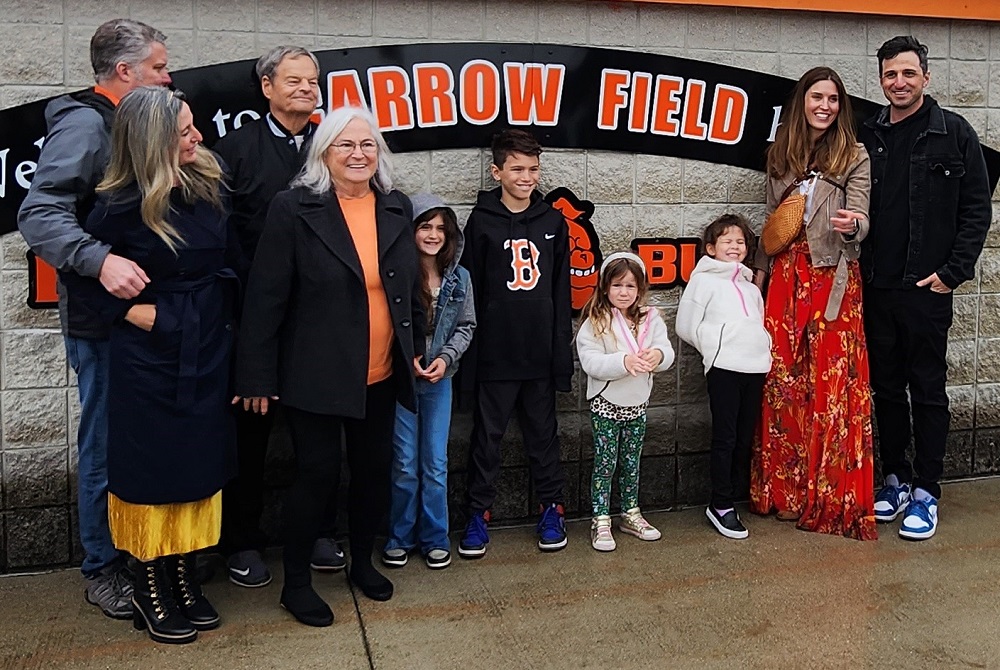
Brighton Names Baseball Field for Program Builder, Longtime Leader
By
Tim Robinson
Special for MHSAA.com
May 4, 2023
BRIGHTON — Mark Carrow didn’t know what to expect April 22 when he arrived at Brighton High School’s baseball field, where he was the guest of honor for a ceremony officially naming it Carrow Field.
 “I remember back in October, when they announced this would happen, I told my wife, Mary, that there will be probably 60-70 people here, because there are 18 players on each team and their parents,” he recalled. “We pulled up here and there were all these people, and these young men who look older now.”
“I remember back in October, when they announced this would happen, I told my wife, Mary, that there will be probably 60-70 people here, because there are 18 players on each team and their parents,” he recalled. “We pulled up here and there were all these people, and these young men who look older now.”
Dozens of Brighton alumni, some of whom Carrow hadn’t seen since their high school days nearly a half-century ago, were in attendance for the ceremony held before a doubleheader with Ypsilanti Lincoln.
Carrow retired in 2006 after 34 seasons as Brighton’s baseball coach, recording 823 wins, now eighth on the state’s all-time list. He also was an assistant football coach and coached both boys and girls middle school basketball.
He came to Brighton a year after graduating from the University of Michigan, where he played baseball for the Wolverines, starring at third base.
“My dream was to coach baseball at Ann Arbor High,” Carrow said of his high school alma mater, now Ann Arbor Pioneer. “That was my dream.”
But he had applied to Brighton Area Schools as well, and after a year teaching in Grand Rapids, he and Mary both were offered teaching positions.
“Wouldn’t you know it? We were in school for two days and Ann Arbor calls me up,” Carrow said. “They had a phys ed job open. I’d have been the JV football coach, and I knew the baseball coach was on his way out. It was everything I wanted, and I went to (administrator) Bob Scranton and said, ‘Here’s what’s happening.’ He told me to think about it over the weekend and come back Monday.
“My wife and I talked it over, and we were so grateful to Brighton for giving us a chance to be near our hometown that we felt we owed them a year,” Carrow said. “In November, we bought a house that we lived in for 22 years.”
Brighton’s sports teams weren’t the dominant squads of today. The football team had had two winning seasons in 20 years, and the year Carrow arrived went 0-9.
“We played in six homecoming games, including our own,” he said. “Everyone wanted to play us.”
The baseball team wasn’t much better, having gone decades without a winning season.
But the Bulldogs were 12-12 that first spring under Carrow’s leadership, and never finished below .500 during the rest of his tenure.
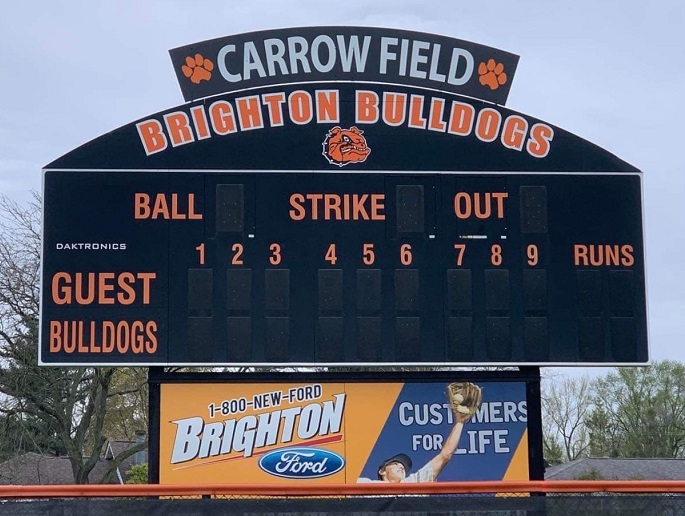 The Bulldogs joined the Southeastern Conference the next year and got off to a 7-0 start before losing at Lincoln.
The Bulldogs joined the Southeastern Conference the next year and got off to a 7-0 start before losing at Lincoln.
“The kids were crying on the bus ride home,” Carrow said, “and I knew right then that Brighton had turned a corner, that it meant something to win and losing wasn’t acceptable anymore.”
Brighton took off, winning 20 games or more in all of his last 23 years as a coach, and a total of 13 league titles, 12 District titles, three Regional crowns and while making two trips to the Semifinals.
The talent was there, too, including 16 all-state players and two Mr. Baseball Award winners in Ron Hollis and Drew Henson.
Carrow earned national and Michigan Coach of the Year honors three times apiece and was inducted into the Michigan High School Baseball Coaches Hall of Fame in 1992.
The field was renamed in his honor after the Brighton school board changed its policy to allow the renaming of facilities to honor living persons less than two years ago.
But Carrow is quick to cite the reasons for his success.
“The players are the ones who made this possible,” he said. “I mean that from the bottom of my heart. I never threw a pitch or hit the baseball. I got 800 wins, but it was because of them.
Carrow has a photographic memory, which came in handy while chatting with former players.
“It was funny, because with each kid I remembered an incident about them,” he said. “Jeff Bogos, who I hadn’t seen since he graduated in 1979, came out and I said, ‘Do you remember when we were at Milan and your knee went out (of place) in the middle of the field?’ It happened twice. He said, ‘How do you remember that?’ And I said, ‘How could I not?’”
Carrow moved to Florida after his retirement, where he and his longtime assistant, George Reck, meet up a couple of times a week. He makes frequent trips north to watch U-M football and to visit his son, Chris, who lives in Chicago.
Baseball is firmly in his past.
“I think I’ve been to one high school game since I went down there,” Carrow said. “I hated the way the coach was coaching, and Mary did, too. She said, ‘We don’t have to watch any more high school baseball,’ and I said, ‘You’re right.’”
When he retired, Carrow said he would likely be forgotten in a few years.
Seventeen years later, his legacy is assured and his memory will be invoked any time one looks at the scoreboard in left-center field that has a “Carrow Field” sign on top of it.
Not bad for a coach who was in the right place at the right time.
“My dream was fulfilled, and rightly so,” Carrow said. “And, believe me, I made the right decision. I couldn't have had better kids to teach or lived in a better community. It couldn't have worked out any better.”
PHOTOS (Top) The Carrow family stands together in front of the welcome sign to Carrow Field – including daughter Tiffany (front left), Mark and Mary (second from left, front and back) and son Chris (far right). (Middle) The Carrow name stands tall atop the scoreboard at the field named for the longtime coach. (Family photo by Daniel Collins.)
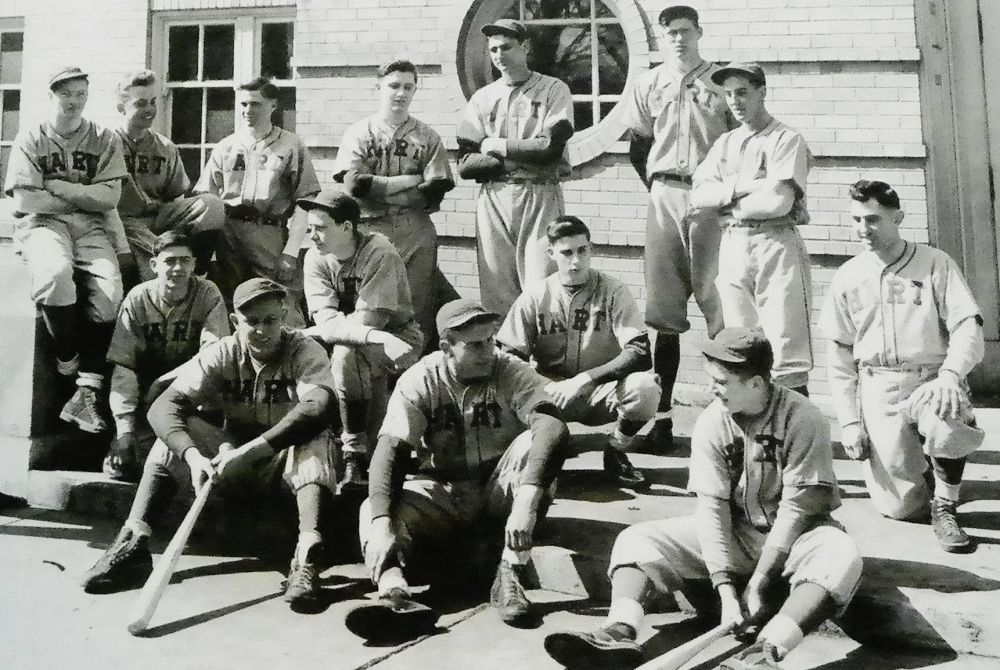
Hart Teammates Reunite After 80 Years Now as WWII Vets, Great-Grandfathers
By
Tom Kendra
Special for MHSAA.com
June 7, 2023
Walter “Stretch” Hansen and Harold Tate were good friends and high school basketball and baseball teammates at Hart High School, graduating in 1943.
 No one could have guessed that less than two months after graduation (on July 2, 1943), the two friends would head to Fort Custer in Battle Creek, the first stop on their way overseas to fight for their country in World War II.
No one could have guessed that less than two months after graduation (on July 2, 1943), the two friends would head to Fort Custer in Battle Creek, the first stop on their way overseas to fight for their country in World War II.
No one could have imagined how many twists and turns their lives would take over the next 80 years – from the battlefields in the South Pacific, then back to West Michigan where they both were married with children, grandchildren, great-grandchildren and now Harold even has a great-great-grandchild.
And, certainly, no one would have believed that the two young boys from Hart – who forged a friendship through high school sports long before the days of computers, microwave ovens and cell phones – would still be alive at the age of 98 for an emotional reunion last month, on May 22, seeing each other for the first time in 80 years and, to cap it off, the reunion took place in their hometown of Hart.
“It was such a great day,” Hansen said about the meeting, which was set up by Muskegon-area World War II historian Richard Mullally.
“We picked right up, talking about sports and the service and everything else.”
The conversation came easy for the two old friends, who played for Hart during a “golden era” at the school – particularly in basketball, as the Pirates won 11 West Michigan Conference basketball titles between 1940 and 1954.
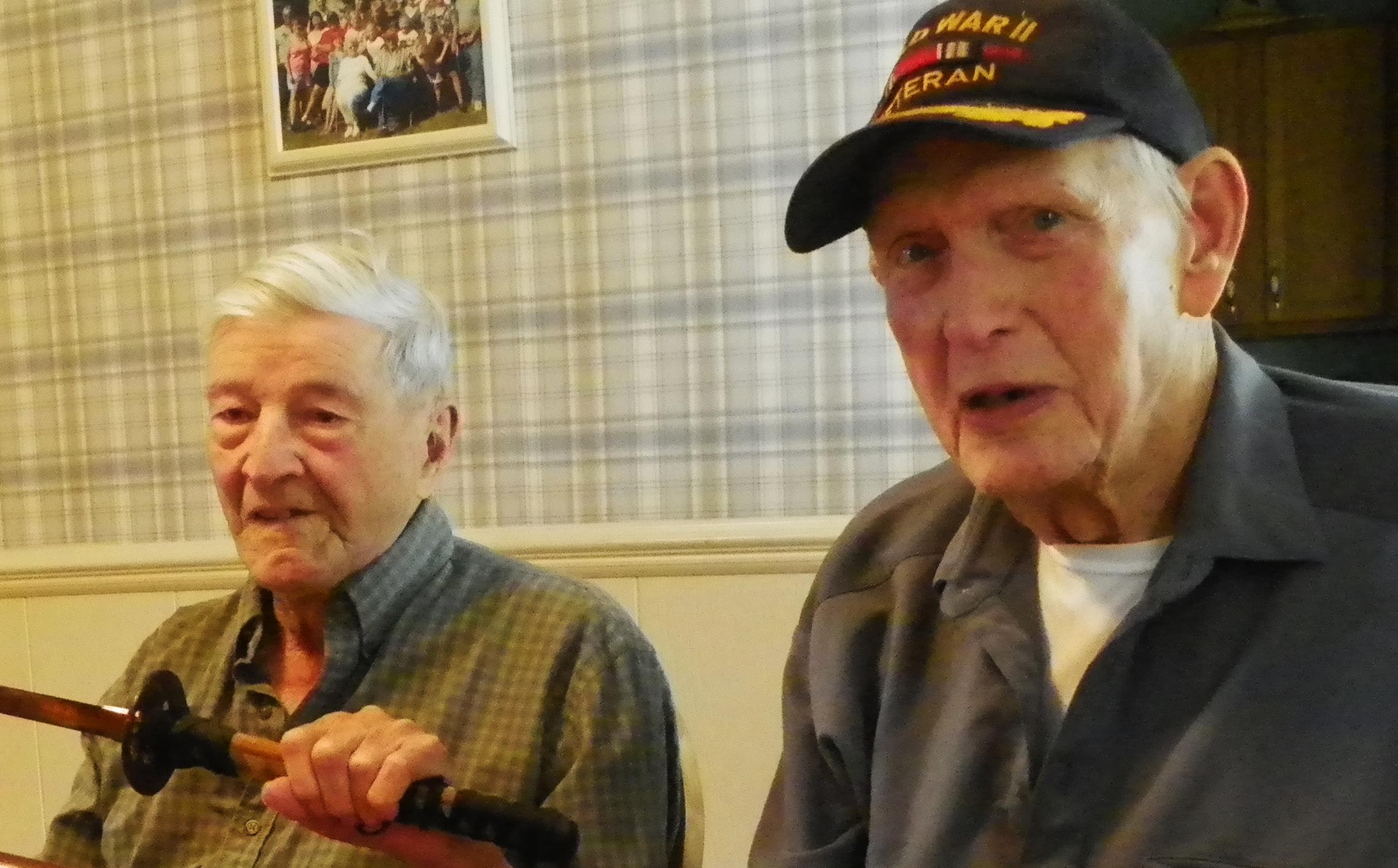 Perhaps the best team during that time period was Hansen and Tate’s as seniors in 1943. That team lost only once, to rival Scottville (31-25), but more than made up for it with an 80-10 trouncing of the Spartans in the final regular-season game.
Perhaps the best team during that time period was Hansen and Tate’s as seniors in 1943. That team lost only once, to rival Scottville (31-25), but more than made up for it with an 80-10 trouncing of the Spartans in the final regular-season game.
Hart then crushed Scottville and Newaygo to win the District championship, only to have Michigan’s prep basketball season stopped abruptly at that point because of World War II.
That 1943 team featured four starters over 6-0, led by the duo of Hansen and Stan Kapulak (both 6-6), Joe Mack (6-2), Lyle Burmeister (6-1) and Stanley Riley (the lone starter under 6-foot at 5-11).
“The newspapers called us ‘The Hart Skyscrapers,’” said Hansen, who will be 99 on Nov. 6. “We were taller than most college teams at that time.”
Hansen and Tate’s friendship continued to blossom on the baseball field, only to have their lives turned upside down shortly after graduation 80 years ago, when all Hart senior boys who had been drafted headed to Battle Creek as a brief staging area on their way to the battlefields of Europe and the South Pacific.
Hansen served in the Army Specialized Training Program and was part of the 52nd Signal Battalion and the 4025th Signal Battalion in the Pacific Theater.
“I had an all-expense paid tour of the South Pacific,” Hansen said with a chuckle. “The Philippines, New Guinea, Okinawa, Hawaii, all over the place.”
Tate did his service in the 24th Infantry Division and the 19th Infantry Regiment, and was stationed in Japan.
During their visit last month, Harold showed off the Japanese Samurai sword and Arisaka rifle which he had sent back from Japan to Hart. The week after their visit, both took part in Memorial Day parades – Hansen in the Lakeside parade in Muskegon and Tate in his 77th Memorial Day service in Hart.
Hansen, who still has a home on a small lake in Holton and lives at a senior care facility in Muskegon, played many years of semi-pro basketball and did some coaching. He worked at GTE and has five children and 10 grandchildren.
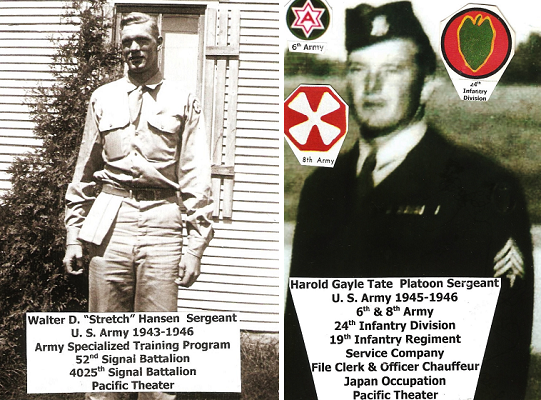 “I have been so blessed,” Hansen said, sorting through one of his many scrapbooks. “All five of my kids are great and I have grandkids that are just amazing, everything they are doing. I don’t even know all of their names, but it’s sure been fun watching them.”
“I have been so blessed,” Hansen said, sorting through one of his many scrapbooks. “All five of my kids are great and I have grandkids that are just amazing, everything they are doing. I don’t even know all of their names, but it’s sure been fun watching them.”
Tate returned to Hart after his military service and has been there ever since, at first working as a carpenter with his father and then becoming a rural mail carrier for the U.S. Postal Service, retiring 26 years ago at the age of 72. He has lived in the same home for 75 years and has three children, six grandchildren, seven great-grandkids and now one great-great-grandchild.
Tate laments the demise of his beloved American Legion post in Hart, a town with just over 2,000 residents, as the number of members has steadily declined.
One topic that brings a smile to both of their faces is the recent resurgence of the Hart High School athletic program, which drew media attention not too many years ago for all the wrong reasons – notably a football program which went 24 years without a winning record.
That string was snapped with a 6-3 mark and the school’s first earned playoff appearance last fall.
But that was just the start.
This winter, Hart’s boys basketball team finished the regular season 22-0, the girls basketball team made it to the Division 3 Semifinals at the Breslin Center, wrestling qualified for the Team Finals for the fourth-straight year and competitive cheer placed fourth in Division 4. This spring, the Hart girls track & field team won its second-straight Division 3 Finals team title, and the boys placed fourth.
“It’s a great place to call home, a great place to live, always has been,” said Hansen of his hometown, which got its name from its central position in the “heart” of Oceana County.
And who would have imagined that these two high school teammates could still come home again for a reunion at the age of 98?
 Tom Kendra worked 23 years at The Muskegon Chronicle, including five as assistant sports editor and the final six as sports editor through 2011. E-mail him at [email protected] with story ideas for Muskegon, Oceana, Mason, Lake, Oceola, Mecosta and Newaygo counties.
Tom Kendra worked 23 years at The Muskegon Chronicle, including five as assistant sports editor and the final six as sports editor through 2011. E-mail him at [email protected] with story ideas for Muskegon, Oceana, Mason, Lake, Oceola, Mecosta and Newaygo counties.
PHOTOS (Top) Members of the 1943 Hart High School varsity baseball team gather together, preparing for a team photo. Among those are Harold Gayle Tate (far left) and Walter "Stretch" Hansen, at 6-6 the tallest player in the back row. (Middle) Hansen, left, and Tate reunite for the first time in 80 years on Monday, May 22, 2023, in their hometown of Hart. (Below) Hansen served from 1943 to 1946 as a Sergeant in the Pacific Theater during World War II. Tate served from 1945 to 1946 as a Platoon Sergeant in the Pacific Theater during World War II. (Top photo courtesy of Stretch Hansen. Middle and below photos courtesy of Richard Mullally.)

